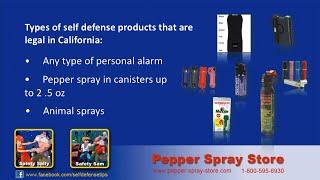Table of Contents
- Understanding Federal Regulations on Pepper Spray Ownership and Usage
- Navigating State Variations Within Federal Pepper Spray Laws
- Safety Guidelines and Responsible Pepper Spray Handling
- Legal Consequences of Misuse and How to Stay Compliant
- In Retrospect
Understanding Federal Regulations on Pepper Spray Ownership and Usage
When it comes to owning and using pepper spray, federal regulations primarily serve as a baseline, while individual states have the authority to enact stricter rules. At the federal level, pepper spray is classified as a self-defense tool and is generally permitted for civilian use without requiring a license or registration. However, it is crucial to note that travelers on airplanes or within federal buildings face strict prohibitions. The Transportation Security Administration (TSA) expressly forbids carrying pepper spray in carry-on luggage, though small containers with specific limits might be allowed in checked baggage under certain conditions.
Key federal points to consider include:
- Possession is legal for self-defense purposes, but misuse can lead to criminal charges under assault statutes.
- Interstate transportation must comply with TSA and local state regulations to avoid confiscation or legal issues.
- Use of pepper spray by minors or individuals with felony records may be restricted under federal or state laws.
Navigating State Variations Within Federal Pepper Spray Laws
While federal regulations provide a baseline for the possession and use of pepper spray, navigating the patchwork of state laws can be complex. Each state implements its own set of rules, often dictating the permissible size, concentration, and even the places where pepper spray may be carried. It’s crucial to be aware that what’s legally acceptable in one state could be restricted or entirely prohibited in another. For example, some states limit the container size to less than 2 ounces, while others have no such restrictions but enforce strict age requirements or mandatory safety training.
Understanding these nuances not only helps ensure compliance but also protects users from unintended legal consequences. Be sure to check for specific variations such as:
- Age restrictions-Minimum age for purchase or possession can range from 16 to 18 years old.
- Usage limitations-Some states restrict use to self-defense only and prohibit offensive deployment.
- Restricted locations-Certain places like schools, government buildings, and airports may have outright bans.
- Permit requirements-A few states require permits or registration for carrying pepper spray.
Before purchasing or carrying pepper spray, always review the latest state law updates and consult local law enforcement if needed. Staying informed empowers you to exercise your right to personal protection legally and responsibly.
Safety Guidelines and Responsible Pepper Spray Handling
Handling pepper spray with care is paramount to ensuring your safety and the safety of those around you. Always store it in a secure, accessible location away from children and pets. When carrying pepper spray, keep it within easy reach but never engage in reckless behavior that might accidentally discharge the spray. Familiarize yourself with the operation of your particular device by reading the manufacturer’s instructions thoroughly before use. Additionally, test sprays or practice handling should be done in open, well-ventilated areas away from crowds to avoid inadvertent exposure.
Employing pepper spray responsibly means understanding when and how to use it appropriately. Never deploy it as a means of intimidation or in situations that do not pose immediate physical threats. After use, move away from the sprayed area promptly to minimize exposure to lingering irritants. Remember, improper usage can lead to legal consequences as well as injury to yourself and bystanders. To maintain control and avoid malfunctions, regularly check the expiration date and ensure your device is in good working order at all times.
- Keep pepper spray in a cool, dry place to preserve its effectiveness.
- Never point the spray at anything other than an immediate threat.
- Inform trusted friends or family members about your pepper spray and its location.
- Attend a safety training or demonstration to build confidence in using pepper spray.
Legal Consequences of Misuse and How to Stay Compliant
Understanding the legal ramifications of pepper spray misuse is crucial for responsible ownership. If used improperly, such as brandishing in non-threatening situations or deploying it in restricted areas, individuals may face criminal charges ranging from misdemeanors to felonies. Penalties can include hefty fines, community service, or even imprisonment. Additionally, misuse that results in bodily harm could lead to civil lawsuits, amplifying financial and reputational consequences. It’s also important to remember that different states may impose varying restrictions, so ignorance of these laws is not a valid defense.
To ensure compliance and avoid legal troubles, consider the following best practices:
- Verify state and local laws before purchasing or carrying pepper spray.
- Use it strictly for self-defense and avoid using it as a prank or intimidation tool.
- Keep the product sealed and store it safely when not in use.
- Complete any required training or certification programs if mandated.
- Keep documentation of purchase and usage guidelines handy in case of inquiries.
In Retrospect
Understanding federal pepper spray laws is essential for anyone looking to carry this form of self-defense. While regulations can vary by state and locality, knowing the baseline federal guidelines helps ensure you stay compliant and use pepper spray responsibly. Always check your local laws before purchasing or carrying pepper spray, and remember that it’s intended strictly for self-protection. Staying informed not only keeps you within the law but also empowers you to make safer choices for yourself and those around you. Stay safe and stay informed!Check Our Other Blogs
- StunGun – Your Trusted Source for Stun Guns, Laws, and Self-Defense Tips
- PepperSprayLaws – Your Trusted Resource for Pepper Spray Information
- StunGunLaws – Your Trusted Guide to Stun Gun Legality and Safety




